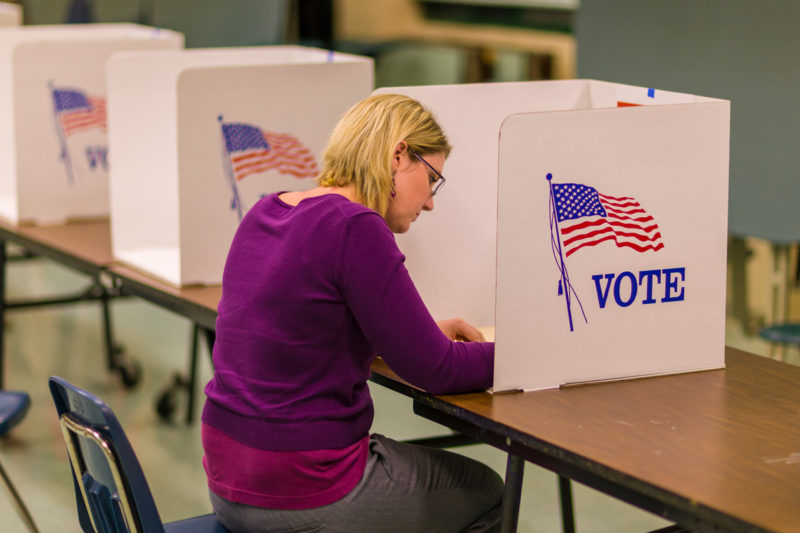Atheists Take Heart (and Office): New Poll Shows Major Support for Nonreligious Candidates
According to the data, among pro-choice and pro-LGBTQ equality voters, a candidate's religious identity is virtually immaterial. Atheists have a good chance to gain seats in the coming years.

In a nation that consistently ranks atheists near the bottom of the “feeling thermometer,” identifying as a nonreligious or humanist candidate has traditionally been seen as a “bad” political move. But a new poll shows there’s virtually no political cost for elected officials to identify as a member of the humanist community.
The poll, conducted by Lake Research Partners* over the course of the midterm elections, measured any loss of support experienced by politicians who identified as atheist; the intensity of any loss of support; and how constituency played a role in that data. The results are heartening to humanists, atheists, agnostics, and other nonreligious people who hold—or hope to hold—public office, as well as to communities that value a political field that’s truly representative of the religious diversity of the United States.
Among registered Democrats who are pro-choice and pro-marriage-equality, fully 74 percent say that a candidate being nonreligious or agnostic would make no difference in their vote, and 72 percent say a candidate’s atheism would not affect their vote. More than three-quarters of all voters are more likely than not to vote for a candidate who stood for most of the things they believed in and was nonreligious. Perhaps among the most surprising details of the report: Voters across party lines view a lack of religious faith as insignificant as long as the voter agrees with the candidate on most issues.
The experiences of nonreligious candidates vary widely, but the impact of their nonreligious identity doesn’t. Underdog Tennessee state senate candidate Gayle Jordan campaigned for a seat in both 2016 and 2018. Jordan publicly identified as an atheist each time. In 2016 her religious identity received no attention, and she earned 25.6 percent of the vote. The seat reopened for a 2018 special election after the Republican incumbent took a position in the Trump administration and the race couldn’t have been more different.
Jordan’s identity as an atheist was attacked by high-ranking members of the Tennessee GOP, including the lieutenant governor and the chairman of the Republican Party of Tennessee. Her opponent and other members of the opposition party accused Jordan of destroying the fabric of American society; asked local clergy to endorse the Republican candidate from the pulpit; and framed her as “dangerous” to the people of Tennessee—all thanks to her desire to lead from a place of rationality and humanistic compassion. Despite these vicious attacks, Jordan increased her share of the electoral takings, earning 28.3 percent of the vote. These attacks didn’t hurt Jordan politically, they simply exposed the Tennessee GOP as chock-full of religious intolerance.
Jared Huffman (D-CA) is the only publicly nontheistic member of Congress, having announced in November 2017 that he’s a humanist and an agnostic. Huffman was first elected to the House of Representatives in 2012, when he won 71 percent of the vote. He was re-elected in 2014 with 75 percent of the vote and re-elected again in 2016 with around 77 percent.When he was up for re-election again in 2018, a full year after he identified with the religiously unaffiliated community, he retained his seat, again earning around 77 percent of his district’s votes. Being agnostic appears to have had no impact.
According to the data, any bias or preference for candidates who believe in God disappears when voters consider their policy stances, in addition to their religious identity. Seventy-two percent of voters polled reported that they would vote for a nonbeliever or nonreligious candidate if that candidate also stood for most of the things they believe in. This crossed party lines, with slight differences. Among Democrats, 79 percent would vote for the nonreligious candidate given the same conditions. Among Republicans, that number barely dropped to 68 percent, while 69 percent of independents shared that view.
Religiously unaffiliated Americans make up almost a quarter of the population. For electoral representation of the nonreligious community to match that proportion would require another 1,500 seats in state and federal legislative bodies. We have a lot of work ahead of us—but humanist candidates, like everyone else, will be running on the merits of their positions, not on any allegiance to a religious creed or identity.
*Full disclosure: Lake Research Partners conducted the poll for the American Humanist Association and the Center for Freethought Equality. The author is not writing here as a representative of the AHA.

